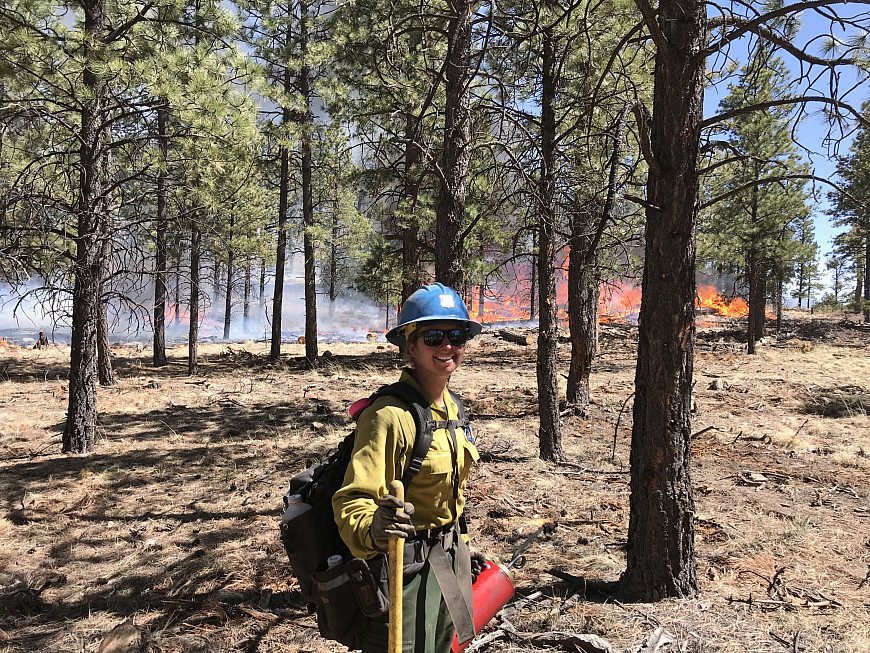Home/
Environmental, Natural Resources, & Energy Law/
Jacqueline O’Keefe: a summer of firefighting and clerking
September 02, 2020
main content Jacqueline O’Keefe: a summer of firefighting and clerking
Jacqueline O’Keefe (3L), shared with us her experience as a firefighter, and clerking this summer for a federal judge.

Jacqueline O’Keefe firefighter
Jacqueline O’Keefe (3L), shared with us her experience as a firefighter, and clerking this summer for a federal judge:
“The 2020 season was my sixth season fighting fire. I started in 2014 on a contract fire engine company owned by my friend’s dad. Contract fire engines and crews get called by the state, tribal, or federal government when there are not enough government resources to respond to a fire. It took some getting used to. On my first fire, of the 25 person ‘strike team’, I was the youngest, least experienced, and the only woman. You also generally work 16 hour shifts for two weeks straight then get two days off and go right back out.
I did this through college but always was drawn to Forest Service crews because it seemed like they got more exciting assignments and spent more time on fire. After I graduated from Colorado College, I applied to be on the Methow Ranger District Handcrew, a 20-person Forest Service resource out of my hometown of Winthrop, WA. I loved the work. The crew felt like a team and quickly became good friends. We got called across the Pacific Northwest and into the Rockies to respond to fires. We usually got to hike in to the fires and utilize burn out (back burn) operations to fight fires.
I loved my experience on the Methow Handcrew, but I wanted to challenge myself more so after that season, I applied to Interagency Hotshot Crews (IHCs) in a few states across the West. Unlike handcrews, there are normally only a couple IHCs in each state and they are national resources, meaning they go wherever there is fire in the U.S. The physical fitness and fire education requirements are higher for IHCs. I was extended an offer by Carson IHC, out of Taos, NM. The “critical training” period was brutal – like 10 mile runs with 3,500 vertical gain at 8,000 feet elevation – but it all paid off when our first fire assignment was to go to the Channel Islands National Park. The rest of the season was extremely busy. Over five months, the crew spent over 100 days on fire and put in 1,000 overtime hours. I loved the people on the crew and loved the work. I worked right up until 1L orientation began, flying out of Sacramento after being on a fire in Redding, CA, the evening before school started.
This summer, the first contract engine company I worked for contacted me and asked if I would be willing to go out on fires. Last summer I desperately missed fighting fire – missed the excitement, camaraderie, spending all day outside – so I happily agreed. In mid-August, I was called to the P515 fire on the Warm Springs Reservation. Because of school starting, I was only able to be there for 8 days and not the typical 2 weeks. It felt great to dig in the dirt, laugh with coworkers, and watch how the land responded to fire – all the things I have always loved about fighting fire.
Fighting fire has made my environmental education (in college environmental science, and now environmental law) feel grounded in something tangible. It can be completely heartbreaking, the toll it takes on both the land and animals, as well as the people around it, but I’m also often struck by how powerful a tool “good” fire can be and how so much of the West’s ecosystem is adapted to it.
This summer, I spent 12 weeks clerking for Judge Ann Aiken, who is a U.S. District Court judge for the District of Oregon. I had a great experience and was able to help draft and finalize two opinions, a pre-hearing memo, and telephonically attend hearings. Judge Aiken and her law clerk expected high quality work and dedication—qualities that I believe fighting fire helped to teach me.”
More Environmental, Natural Resources, & Energy Law Stories
Environmental, Natural Resources, and Energy Law is located in Wood Hall on the Law Campus.
MSC: 51
email elaw@lclark.edu
voice 503-768-6784
Environmental, Natural Resources, and Energy Law
Lewis & Clark Law School
10101 S. Terwilliger Boulevard MSC 51
Portland OR 97219


